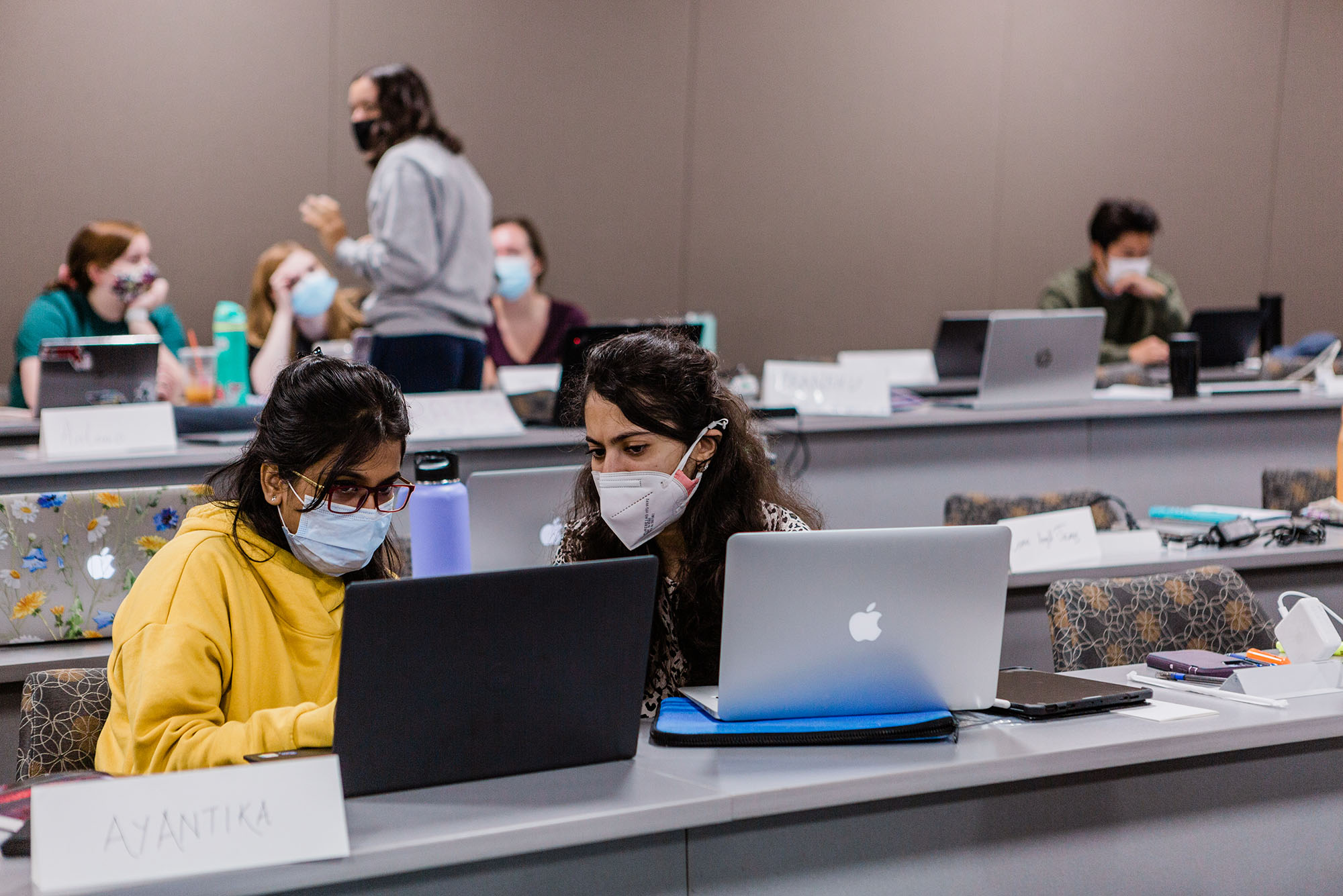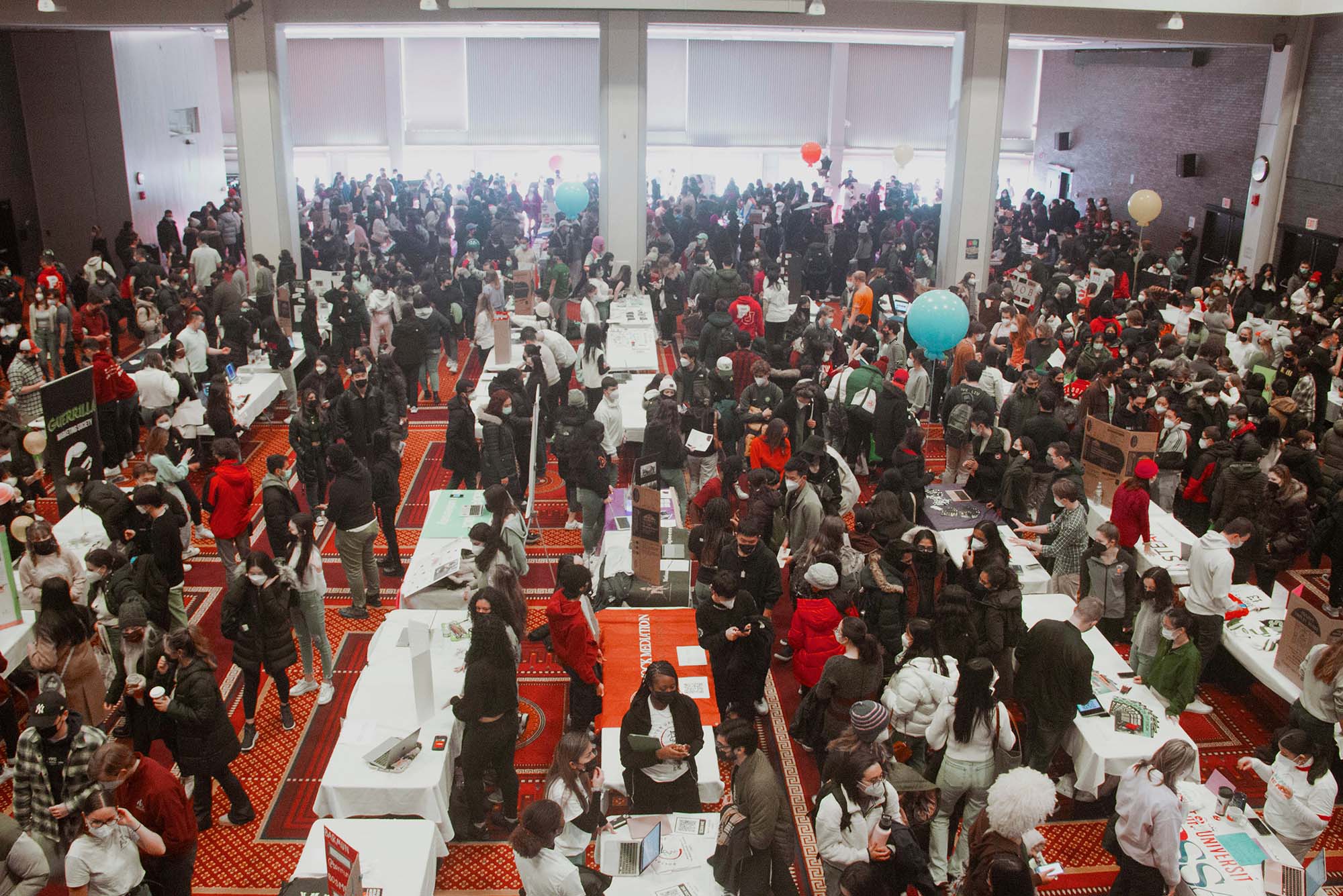What’s It Like Being Back on Campus? Opinions Vary
Some BU community members say being in person is important for their mental health, others feel classes should be held remotely for now

One benefit of in-person classes? Students say they find it easier to make a new study buddy when they do so in person, versus making small talk on Zoom. Photo by Janice Checchio
What’s It Like Being Back on Campus? Opinions Vary
Some BU community members say being in person is important for their mental health, others feel classes should be held remotely for now
Around lunchtime last Friday, the George Sherman Union was packed with tables of friends reuniting from a month apart over intersession. A masked staffer walked around monitoring mask compliance, stopping to ask a student sitting at Rhett’s to put on his face covering, since he was waiting for food, but wasn’t yet eating or drinking.
In the GSU backcourt, Sasha McLeod (ENG’25) and Isaac Cole-Frieman (CAS’25) were eating lunch with friends. While both said they were excited to be back on campus, they did not entirely agree about BU’s approach to handling the Omicron-fueled surge of COVID-19 cases over the holiday break (a surge that has since started to decline).
“I like being back, and I’m glad we’re not remote, because I found it hard to focus during Learn from Anywhere [LfA],” McLeod said. “It’s more engaging being in person.”
Sitting next to her, Cole-Frieman thought about the question for a minute, then said he would rather be studying and living at home for at least the first few weeks of the semester. “All my friends at other schools aren’t back yet, and it just feels like we’re accepting that we’re going to get COVID,” he said, referring to the fact that schools such as Harvard had chosen to be fully remote for the first two weeks of classes, as well as to limit the size of in-person gatherings. “It feels irresponsible—kids are getting the wrong idea that COVID now isn’t as severe. A student told me the other day that they lied about their quarantine period when they arrived on campus. You’re trusting students to be honest. Custodians, dining hall staff, the CityCo workers, they’re the backbone of campus, and they probably see 2,000 of us a day; what if we infect one of them, and then they bring that home to their family?”
The diverging opinions at that single table seem to reflect the broader campus view. BU Today spoke with dozens of students and faculty to gather their opinions on how comfortable they are with BU’s decision to hold in-person classes for the first few weeks of the semester. Some in the community feel that BU was wrong not to hold classes entirely online for at least the semester’s first week, while others believe that BU’s stringent vaccination, PCR testing, and masking protocols (including supplying everyone a month’s worth of free KN95 masks) are enough to keep the campus safe.
One widely appreciated accommodation was President Robert A. Brown’s announcement on January 5 that faculty may provide recordings of lectures for students in isolation through February 18, at which time the policy will be reassessed. (Faculty are not required to provide recordings, however.) Students clamored for this last fall, so those forced to isolate or quarantine because of COVID could more easily stay on top of their missed classes. Under the temporary policy shift, faculty members who test positive for COVID, but are well enough to teach, are asked to contact their dean (or the dean’s designee) and will be allowed to move their class to remote learning via Zoom for the duration of their isolation period, normally five days.

Ameya Khanapurkar (CGS’22) was excited about starting classes last week, saying he feels like last year’s LfA format, where students could elect to study in-person or remotely, didn’t give him the full college experience. “I would feel shortchanged if we revert to that while we have proven methods to keep classrooms safe,” Khanapurkar said. “It’s so two-dimensional over Zoom. Last year [the CGS administration] gave the kids in my program the choice of whether to be in person or a hybrid option, and they placed us into groups. I met some of my best friends here in that class, and I don’t think I’d ever talk to them if I knew them only virtually.”
Sophomore Abby Roberts said she was relieved to hear the news that the semester would be starting in person. Her experience last year was that it was harder to focus in her online classes, and it led to her feeling isolated, putting a strain on her mental and emotional health. “To me, the educational and health benefits of having class in person outweigh the risks, especially given that we’ve never seen too much COVID transmission in classroom settings,” Roberts (CAS’24) says. “The measures that BU has taken to combat Omicron—like increasing undergrad testing to twice a week again and providing KN95 masks—are a reasonable approach to mitigating the damage that Omicron can cause, while also accepting that we are going to have to figure out how to live with this virus without jeopardizing every other part of university life.”
Caitlin Meyer (Pardee’22) is also happy to be back, and applauds the fact that professors can temporarily record lectures, although she finds this accommodation long overdue.
“I mean, there were so many students, myself included, that were not able to access lectures and have a full breadth of resources available to us when we had COVID and ended up missing out on weeks of school,” she said. “That is why we’re all here—like we want to learn and I think that it was frustrating back then, when BU was not using all the resources available to support the students that were unable to learn due to an unexpected circumstance such as COVID.”
When she was interviewed in the GSU, newly arrived freshman Mya Maldonado (CGS’23) was eating lunch with new friend Sophia Bellistri (CGS’23). This semester is the first time Maldonado has taken in-person classes since the start of the pandemic in March 2020, since her high school gave students the option of remote learning and she took the fall semester as her College of General Studies gap semester before starting at BU last week.
“It’s nice to be here, and I’m really happy so far,” Maldonado said. “It’s the first time I’ve dressed up for classes in such a long time, but I’m finding it’s draining to actually talk to people in person all day.”
But others can’t shake the feeling that allowing, but not requiring, professors to record lectures only temporarily isn’t enough. Critics who want lectures recorded for the whole semester have spoken out loudly on Reddit, Twitter, and in Daily Free Press.
“I think the quality of my education is higher in person, but I do wish that LfA was an option for these first few weeks,” said Sara Weinberg (COM’24, Sargent’24). “Cases are so high, and the last thing I want to do is contribute to the spread of COVID, especially to people who are immunocompromised.”
It feels good to be back, but professors don’t seem to be as optimistic…I had a class already, and the professor said anything could happen.
The School of Social Work Student Union has also been vocal in expressing opposition to in-person classes, circulating a petition and a safety demands toolkit. They recently met with Jorge Delva, dean of the School of Social Work and Paul Farmer Professor, to express their concerns. They have also planned a walkout to protest BU’s COVID safety protocols, on Tuesday, January 25, at 1:30 pm outside of One Silber Way (President Brown’s offices).
“There are many of us in the BUSSW who are immunocompromised, chronically ill, or disabled, working in field placements with communities who are vulnerable to COVID-19,” according to a statement the group sent to BU Today. “We don’t want our education to be negatively impacted, and we also don’t want our clients to be negatively impacted. As future social workers, we’re supposed to be helping, supporting, and advocating for the welfare of the communities we work with—and so, these policies that we have to follow seem to be going against what we’re being taught.”
Daniel Star, a College of Arts & Sciences associate professor of philosophy, who has been one of the most outspoken faculty members on BU’s handling of COVID, said faculty don’t want to move their classes permanently online and acknowledged the benefits of teaching in person. But he said that what faculty do want is the permanent (as opposed to the current temporary) flexibility to use remote methods of teaching if they or their families should become sick. He said that students appreciate the temporary use of technology in those cases as well.
“The idea of our administration leaving the decision when to use various remote education technologies to the discretion of faculty, even for a temporary period, seems completely alien to the BU community at this point,” Star said, describing the first week of in-person classes as an unnecessary risk. “Trust between faculty and our senior administration has been significantly eroded, and it is senior University administration that is mainly to blame for this.”
Joelle Renstrom, a CGS senior lecturer in rhetoric, supports the University’s decision to hold in-person classes given BU’s mandates and other mitigation measures, and she believes that being in person, especially for first-year students, is crucial for forging strong, and often lifelong, friendships.
“No matter how hard we tried, there’s just no way to make remote education as effective as in-person education for countless reasons,” Renstrom said. “Whether or not BU should have gone fully remote for the first few weeks given Omicron is a different question, and one I can’t answer. BU, like any other school, is damned if it does and damned if it doesn’t, so there’s no easy or ‘right’ answer to a question like that.”
Comments & Discussion
Boston University moderates comments to facilitate an informed, substantive, civil conversation. Abusive, profane, self-promotional, misleading, incoherent or off-topic comments will be rejected. Moderators are staffed during regular business hours (EST) and can only accept comments written in English. Statistics or facts must include a citation or a link to the citation.